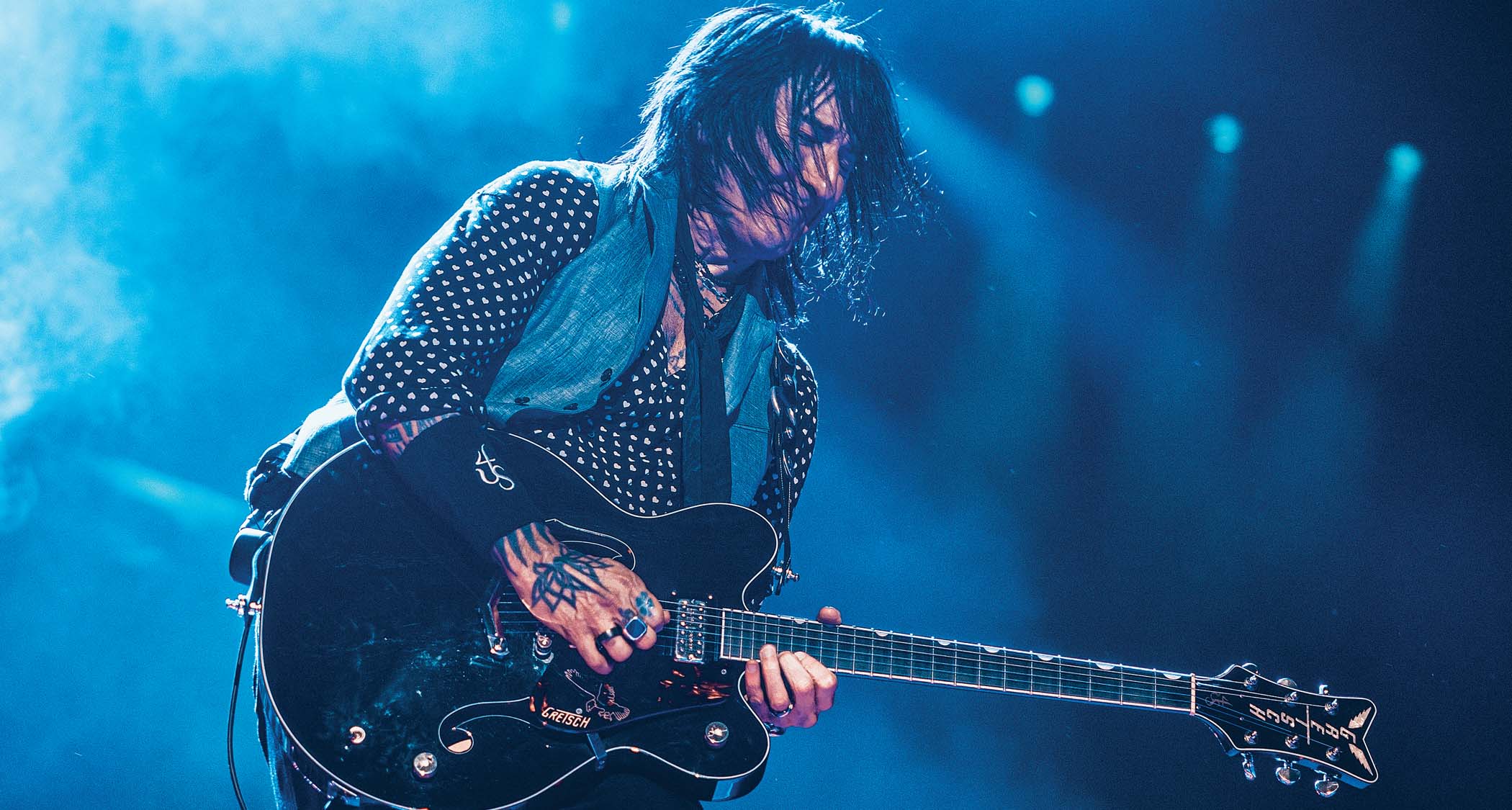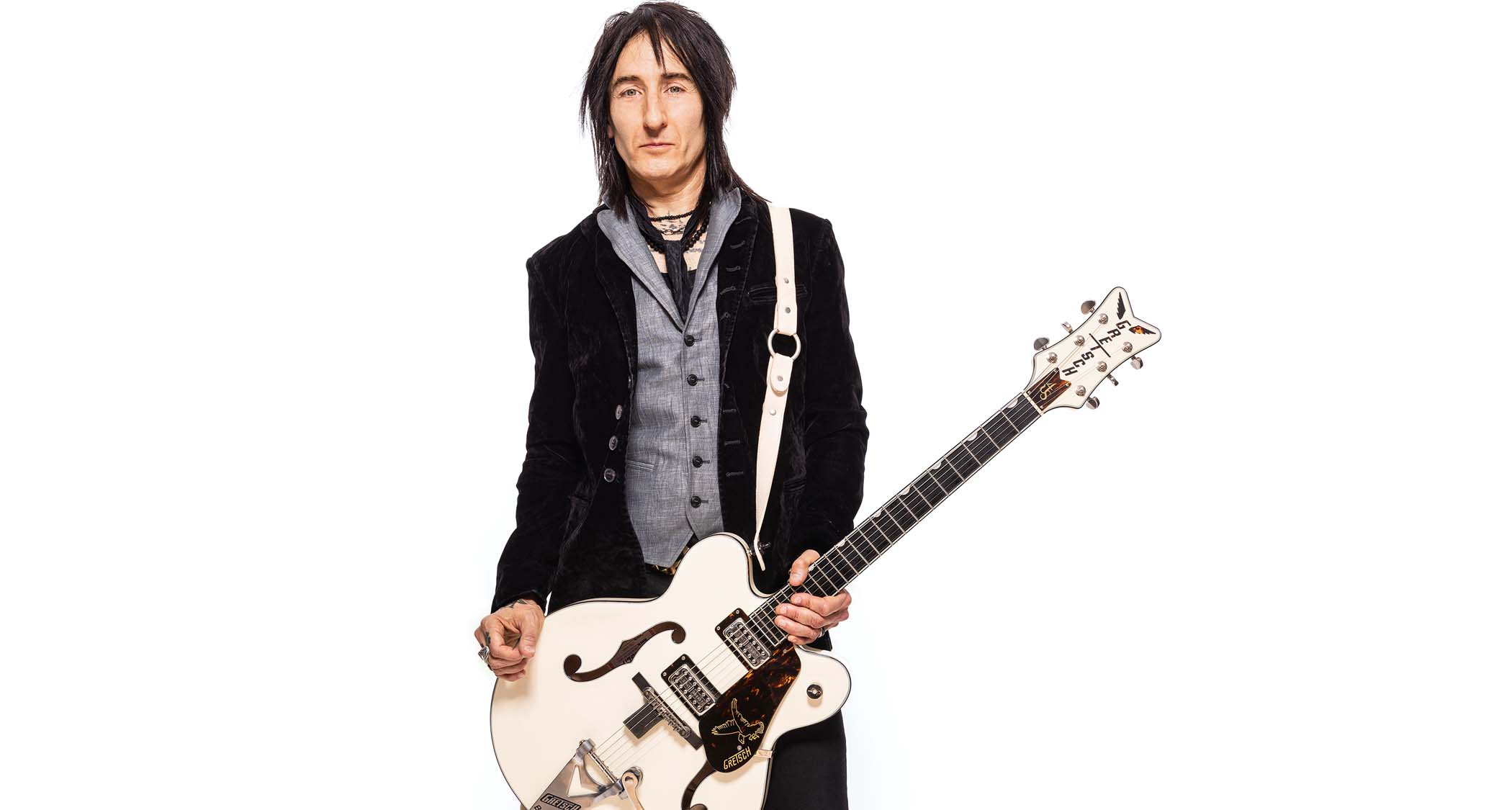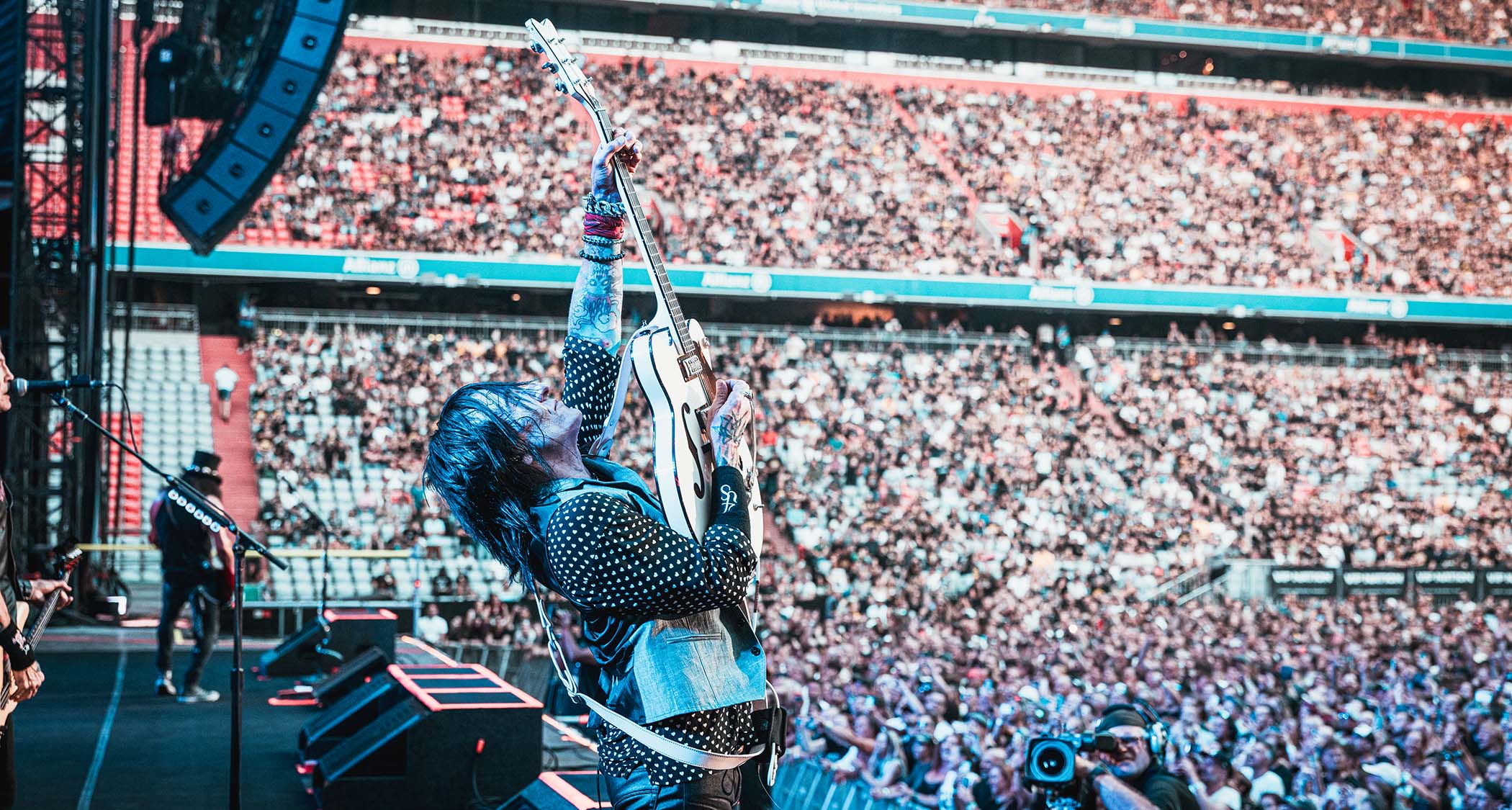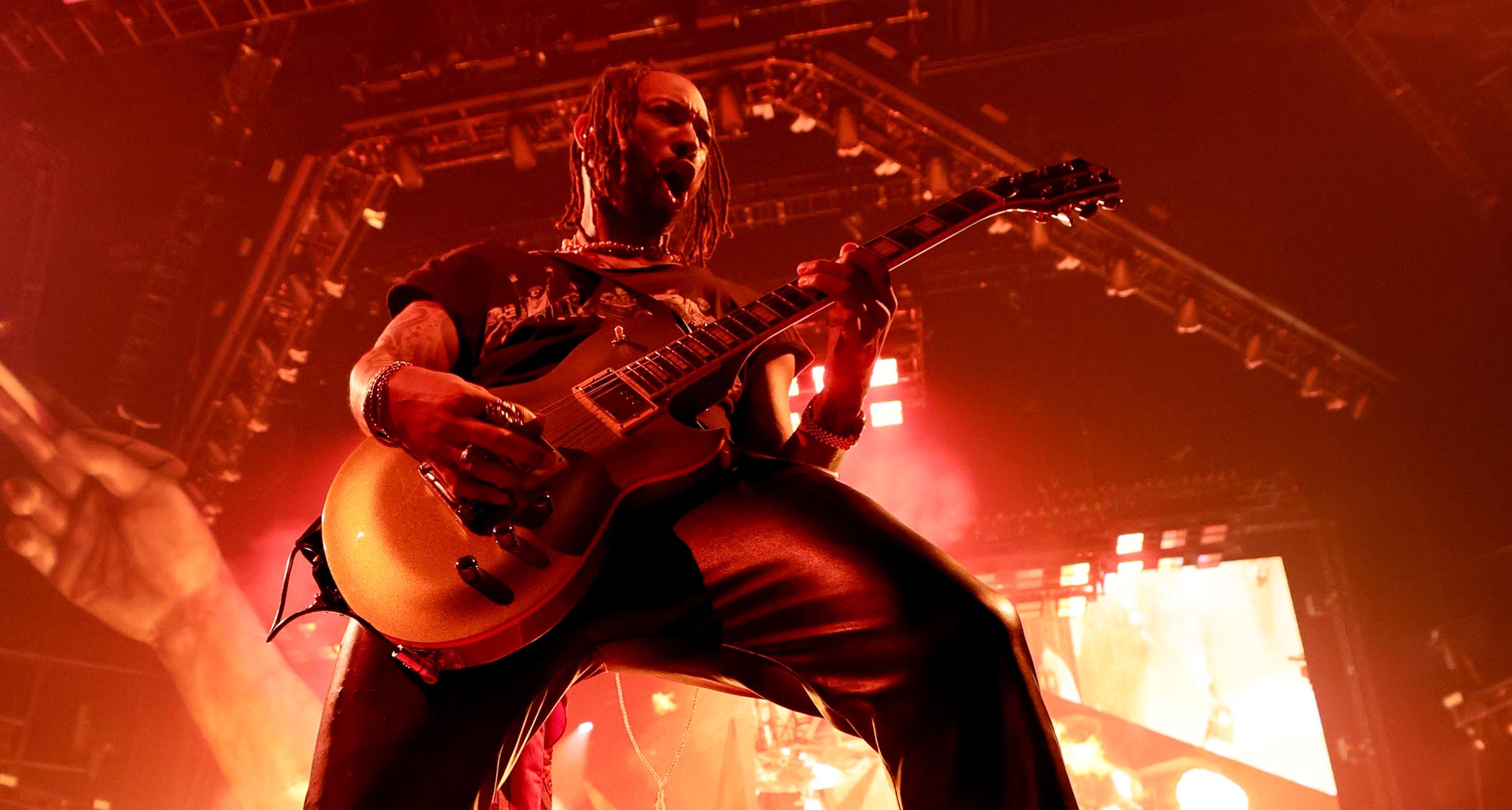“When I first came into the band, it was split into factions. Now everything feels solidified”: Guns N’ Roses’ longest-serving guitarist Richard Fortus on his bond with Slash and why he’s as surprised as anyone he’s still in the band
What does it take to be in Guns N’ Roses for 23 years and counting? For Richard Fortus, it requires tone mastery, the ability to mesh with his legendary gunslinger partner and a highly desirable signature Gretsch

All the latest guitar news, interviews, lessons, reviews, deals and more, direct to your inbox!
You are now subscribed
Your newsletter sign-up was successful
After Slash and Duff McKagan exited Guns N’ Roses in the mid-’90s, things went kinda sideways for a bit. The band kept rolling, but it was host to a cavalcade of guitar players, from Buckethead to Paul Tobias to Robin Finck to DJ Ashba to Ron “Bumblefoot” Thal.
As you can imagine, all that change did not give rise to new music. It’s not that Axl Rose wasn’t writing tunes; it’s just that honing them proved… difficult. But things shifted for the better – on the guitar side, at least – when Richard Fortus, who at the time was touring with Enrique Iglesias, was drafted into Guns in 2002. Fortus brought immediate stability to a situation that was anything but stable.
23 years later, GN’R is still wreaking havoc on a stadium stage near you, but things are very different. “It seems to me that we’re much more unified,” Fortus says today – but that shift only came after Slash and McKagan re-entered Guns’ orbit in 2016.
“When I first came into the band, it was split into factions,” Fortus says. “There was Buckethead, Brain [Bryan Mantia, drums] and Chris Pitman [keyboards/bass] as one little faction. And then there was myself, Tommy Stinson [bass], Robin [Finck] and Dizzy [Reed, keyboards]. That was another faction. And there was Axl, a faction unto himself. [Laughs] It was a different feeling to the band, but now everything feels solidified.”
It hasn’t always been this way for Guns N’ Roses, who first welcomed us to the proverbial jungle in 1987 with Appetite for Destruction and then soaked us with an enduring November rain in the early ’90s.
Back then, lineup volatility and infighting were pretty much standard, but not anymore. Maybe it’s age, maybe it's the fact that drugs and alcohol are no longer part of the equation – or perhaps it’s the simple fact that the world doesn’t usually offer second chances, but it has done so for Rose, Slash and Duff. Whatever the reason, Fortus, who – for those keeping score – is Guns N’ Roses’ longest-tenured six-stringer, is having the time of his life.
“Sometimes Slash and I will play the same thing in harmony or an octave part that we’ve never played before or not worked out at all,” Fortus says. “It’s freakish to me how similar our approach is. It sounds a little metaphysical, but it’s really strange how in-sync we are.”
All the latest guitar news, interviews, lessons, reviews, deals and more, direct to your inbox!
He goes on to say that the main reason for Guns’ modern-day harmonious functionality comes down to the fact that the band is “very united.” “That’s the biggest difference,” he says. “It’s night and day.”
And Slash is at the core of it all.
“Tommy Stinson led the charge when I was first brought into the band,” Fortus says. “He came from a punk-rock ethos of not wanting to over-rehearse, because it was pointless. You know, you do your rehearsing onstage, because no matter what you do, it’s not going to translate onstage, which is true in a way.
“But Slash comes from a completely different perspective. He loves to rehearse, so that when we walk onstage we never have to think about playing. I love that. I understand both sides, but I really enjoy having the music become muscle memory.”
Rehearsing is one thing, and it’s undoubtedly made Guns a tighter unit, but Fortus came into the picture during an era when being a GN’R guitarist meant you weren’t long for this world. That, along with the fact that he’s now occupying a role once held by Izzy Stradlin and Gilby Clarke, means he’s needed to remain on his toes as Slash’s sidekick.
“It’s always fun,” he says. “But when Slash came in, I had to rethink everything because I needed to be able to support his tone, the way he plays and the way he creates. It’s been me thinking, ‘Okay, how can I do that?’ For example, I love P90 pickups, but they don’t work with Slash’s tone. So it’s been about me going back to the chalkboard.”
Guns N’ Roses has plenty of huge shows planned. Beyond that, there have been whispers of the band’s first new record since 2008’s Chinese Democracy, which is significant because GN’R hasn’t dropped a proper full-length featuring Slash and McKagan since 1993’s covers album, The Spaghetti Incident? But to date, we’ve only seen a few singles, like 2023’s The General and an EP from 2022 called Hard Skool. But that might change.
“I think we probably will [put out a new record],” Fortus says. “I can’t see us not doing that in the future, although it seems people don’t really care about albums anymore. It’s hard to say. I’m sure there are quite a few people that would. It's a great honor [to be in Guns], and I'm really glad to have been a part of it, and I think the band is on top form right now.”
It wasn’t a shock to be playing stadiums and doing multiple nights, because it was a big event. What’s shocking is that every time we go out, it continues
You’ve been in Guns for 23 years now. Has the response the band is getting – compared to what it was when you started – been surprising?
When we started with Slash and Duff back in the band, the reaction was overwhelming, but that was expected. It wasn’t a shock to be playing stadiums and doing multiple nights, because it was a big event. What’s shocking is that every time we go out, it continues. We’re still playing stadiums. I expected it to die down once the initial reaction wore off, but it’s continued. It’s incredible.
GN’R was at a crossroads when you joined in 2002. How do you view your role now compared to then?
It’s been a pretty massive change. Robin Finck was my favorite guitarist I played with, besides Slash, and was the one I felt most unified with. With Slash, it’s a whole different level. I’ve never played with another guitar player I feel so in-sync with.
What’s an example of how things work between you two?
There’s a section in Rocket Queen where it’s completely open. I’ll play a solo and then Slash plays a solo, and it’s a completely different solo every time. The other night, I played a melody at the beginning, and when Slash played his solo, he quoted that melody.
I thought, that’s what I’ve always dreamed a band to be, you know? And he didn’t even realize he did it! It’s almost jazz – when someone plays a theme and someone else picks up on that theme. That’s as good as it gets. He’s such a natural musician. It’s such a joy to play with somebody like that.

You’re occupying a role once filled by Izzy Stradlin and Gilby Clarke. Do you play their parts straight, or do you have freedom to improvise?
I can’t really speak to the Gilby thing as much, but with Izzy, there are certain things I view as integral. There’s never been a time when Slash has said to me, “I think you should copy what Izzy did here.” He’s very much in the moment. He’s come back to me and said, “I listened to this live recording we did, and I didn’t realize you were doing that. That’s really cool.”
But he’s never said, “I think you should do this…” He is very trusting with how I approach things. But there are things that – out of respect to the genius of Izzy and what makes this band legendary – I play what I think is integral to the song.
There are moments with a lot of the stuff that I interpret in my own way, but I feel very akin to Izzy’s approach and where he was coming from with the songs. I think about that spirit when I approach a song.
The recording of Chinese Democracy took place over many years. What was that like?
My parts on those songs came about very quickly, because they were already written when I came into the band. The only thing I wrote on that record was the chorus to Better. Everything else was done. I was just putting on parts, which was challenging because everything had to be structured with three guitar players.
We were working out parts that had come before, as well as for the new songs, so everything was very structured because everything has to have its place when you have three guitar players. You have to keep out of each other’s way.
That was something Buckethead did a really good job at. He understood how to make that work. He would lay out on the verses, come in on the choruses and then come in with a solo or play things that would augment what Robin and I were doing.
It must have been interesting to watch Buckethead work within the Guns paradigm, since he’s not traditionally been associated with that style of music.
True, but ultimately, he’s very musical. He understood the big picture of what was going on and always came at it from that perspective. He’s incredibly prolific, right? He’s put out, like, 137 albums or something. [Laughs] But he’s very much the type of guy that does his own thing.
That’s the aspect about the Buckethead – and Ron “Bumblefoot” Thal – era of Guns that sticks out, and perhaps why it was a little musically volatile.
It’s difficult for somebody that’s used to doing that. Ron was used to doing his own music. Being in a band is a very different thing than sitting in your studio or your bedroom and creating your own music. When you’re out playing bars and clubs as a band, it’s a very different thing, a very different dynamic.
When you look at what Duff and Slash have brought to the table over the last nine years, does any of what we’re talking about from the Chinese Democracy era remain?
I really don’t think so. [Laughs] There’s an organic quality that Slash and Duff bring that is inherent to who they are as musicians. It speaks to where they’ve come from and what they’ve brought back into this.
When you look at where you started when you joined GN’R and compare it to today, can you track the changes in your rig?
The key to my signature model is the pickups and electronics. We came up with something that is unique and not like anything else in the Gretsch line
My journey has been very long and arduous when it comes to gear and the things I have to cover. [Laughs] A lot of the stuff I’m playing now isn’t the stuff I played on Chinese Democracy; I’m covering a lot of what Buckethead did.
I went through periods where I was using multiple amps and channels, but now it’s simplified. When we play live, we run a mono mix, and it’s an analog desk. It’s very old-school.
Does that help bring the classic GN’R guitar sound to the forefront?
I think it brings a lot more dimension and danger into the sound. Slash and I run mono rigs because it’s a mono PA, so it’d be silly for us to have stereo rigs. But I’ve simplified things; I have two amplifiers that I run and that I hit all the time.
I’m just running two single-channel amps, a 100-watt head, a Magnatone combo and a Magnatone Twilighter mono combo. I’m hitting them together throughout the night. I’m constantly on my volume knob, as is Slash. My clean sound is just dropping down the volume.

Where did that approach come from?
It’s very old-school. I simplified it and approached it in a Malcolm Young type of way. For the older stuff, my job is to support what Slash is doing, and for there to be a natural juxtaposition between two guitars.
So I wanted to go with a cleaner type of tone, similar to Malcolm, and how he spits around Angus Young’s tone. It’s the same type of dynamic. It’s also like Joe Perry and Brad Whitford; you can tell the district guitar tones apart and hear how one supports the other.
Has Slash been a big influence on how you look at gear since he rejoined?
Slash is a legend, so he has a sonic fingerprint that is very much him, although his tone has changed a lot since he first got in the band. I think he plays with a lot less gain, and his tone has gotten bigger, which makes my job harder. [Laughs] But obviously, my signature Gretsch has been the biggest piece in the puzzle for me – and lower-gain amps.
There’s an argument to be made that your Gretsch Falcon G6636TRF signature guitar is as synonymous with GN’R as Slash’s Les Paul at this point.
That’s pretty cool. I hate to keep going back to it, but Malcolm Young had the perfect rock rhythm tone. I’ve got to cover more ground than Malcolm, but I loved how huge-sounding the Gretsch is.
I love how there’s a lot of low-end and a lot of top-end, but I need to be able to do more than just that, so we’ve spent a lot of time working with Gretsch on those pickups. They were fantastic to work with.
What’s the secret sauce to those pickups that separates them from standard Gretsch Filter’Trons?
The key to my signature model is the pickups and electronics. We came up with something that is unique and not like anything else in the Gretsch line.
Those pickups are a hybrid of vintage Filter’Trons and vintage PAFs in tone and construction. John Gaudesi, who’s no longer with Gretsch, brought his pickup winder to rehearsal, and he had our front-of-house engineer in the control room, listening on reference monitors while we were in rehearsals.
My tech had four prototypes, and we’d swap the pickups in and out quickly, so we had a rotation of four guitars, and John would wind pickups based on our comments. We’d make comments, the control room would make comments, and he’d go, “I know what I need to do. Let me try this magnet or this wind,” and we narrowed it down until we came up with the right formula.
Some of the more fun guitar moments in Guns’ current show are the classics, like Paradise City and November Rain. How do you approach those?
I never had a big vision as far as how I saw things going. Nor did I anticipate still being here with Axl after a quarter of a century
I make subtle changes to things based on what Slash is doing, or on the way things are going in rehearsal or live. Things change all the time, and it’s been a process to where things just develop.
I’m sure it’s the same way if you watch a Rolling Stones video from 1981; it’s fascinating for me to watch how their guitar parts have changed so much since then and how different they were in ’81 from the original recordings. Songs just develop over time when you play them live every night.
When you came into GN’R 23 years ago, given all the early volatility, did you have a vision of how things would play out?
No. [Laughs] I just took each year as it came. I never had a big vision as far as how I saw things going. Nor did I anticipate still being here with Axl after a quarter of a century. I never really thought about it. I think about the next six months. What I’m consistently focused on is what’s coming up next, whether it be with Guns, another artist or whatever.
How do you see GN’R’s future unfolding?
I see us continuing to put out new music, but like I said, I don’t think about things more than a year out. That’s my focus. It’s always on the next rung in the ladder. I’m not looking at where I’ve come from or where I’m going, long term. I’m just constantly trying to move up.
- This article first appeared in Guitar World. Subscribe and save.
Andrew Daly is an iced-coffee-addicted, oddball Telecaster-playing, alfredo pasta-loving journalist from Long Island, NY, who, in addition to being a contributing writer for Guitar World, scribes for Bass Player, Guitar Player, Guitarist, and MusicRadar. Andrew has interviewed favorites like Ace Frehley, Johnny Marr, Vito Bratta, Bruce Kulick, Joe Perry, Brad Whitford, Tom Morello, Rich Robinson, and Paul Stanley, while his all-time favorite (rhythm player), Keith Richards, continues to elude him.
You must confirm your public display name before commenting
Please logout and then login again, you will then be prompted to enter your display name.










